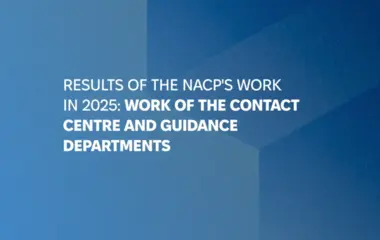The National Agency on Corruption Prevention (NACP) carries out expert strategic analysis of corruption risks to identify and eliminate corruption schemes, as well as anti-corruption expertise of draft legal acts. In 2024, the focus of the corruption risk study was on the recovery and medical sectors, as well as the activities of military medical commissions.
"In the context of today's security challenges, transparent legislation devoid of opportunities for abuse is a prerequisite for the effective implementation of projects to rebuild Ukrainian cities and villages affected by Russian aggression. It is important to prepare for the post-war reconstruction process in advance and create a legislative framework that would guarantee an effective reconstruction process,” said Deputy Head of the NACP Sergiy Gupiak.
In 2024, the National Agency prepared an analytical study “Top 10 Corruption Risks in the Implementation of a Pilot Project for the Restoration of Settlements Affected by the Armed Aggression of the Russian Federation.” Experts conducted a comprehensive analysis of the recovery processes on the example of the pilot project and analyzed the relevant legal framework. As a result, they identified 10 corruption risks that create prerequisites for possible abuse during the selection of objects for restoration, participants in public procurement and financing of these works. NACP provided recommendations to the Cabinet of Ministers of Ukraine, the Ministry of Community and Territorial Development of Ukraine, the State Agency for Reconstruction and Development of Infrastructure, and other central and regional authorities to eliminate these corruption risks.
Pursuant to the decision of the National Security and Defense Council of Ukraine of October 22, 2024, the NACP, together with the Institute of Legislative Ideas (ILE) and with the support of the Pro-Integrity project, checked the status of implementation of the recommendations identified in the study “TOP-10 Corruption Risks of Medical and Social Expertise for Disability Determination”, which was conducted in 2021 and updated the study to take into account the legal regime of martial law.
NACP collected and analyzed information from the Ministry of Health of Ukraine, the Ministry of Social Policy of Ukraine and the NGOs Independent Anti-Corruption Commission and All-Ukrainian Human Rights Organization “Legal Hundred” on the implementation of previous recommendations to minimize corruption risks in the work of medical and social expert commissions (MSECs).
The results of the monitoring confirmed that most of the measures proposed by the NACP for public authorities are either in the process of implementation or have not been implemented. NACP emphasizes that the implementation of the recommendations provided earlier would minimize corruption risks and prevent numerous corruption schemes in the process of establishing disability.
Taking into account the legislative initiatives proposed by the Government related to the liquidation of the MSEC and the introduction of an assessment of a person's daily functioning, the NACP proposed to define a clear and transparent mechanism for conducting such an assessment. To this end, it sent updated recommendations to eliminate corruption risks, in particular to the Ministry of Health, the Ministry of Social Policy, the Ministry of Digital Transformation, the Ministry of Defense and the Verkhovna Rada of Ukraine.
In addition, NACP, together with the NGOs Independent Anti-Corruption Commission, Human Rights Center for Servicemen “Principle” and All-Ukrainian Human Rights Organization “Legal Hundred”, monitored the implementation of recommendations to eliminate corruption risks in the Military Medical Clinical Commissions of the Armed Forces of Ukraine. As of November 2024, most of these recommendations were only partially implemented by the Ministry of Defense and the Ministry of Health.
The main challenges in implementing the recommendations are regulatory uncertainty, unregulated procedures for forming the composition of the MECs, appointment of heads and chairpersons of full-time and part-time MECs, lack of digitalization of document flow and proper control over medical records, non-transparency of the mechanism for appealing MEC decisions, unregulated remuneration of doctors, etc.
NACP sent the results of monitoring the implementation of the recommendations to the Ministry of Defense and the Ministry of Health to speed up the work on eliminating corruption risks.
“The general conclusion shows the need for the responsible authorities to implement the recommendations without delay, in particular, to eliminate shortcomings in the legal regulation of the activities of the Military medical commissions and ensure transparency of processes, which is critical for overcoming corruption risks in this area,” said Serhii Hupiak.
In the area of anti-corruption expertise, the NACP analyzed 4176 draft legal acts and conducted 102 anti-corruption examinations. Experts identified 275 corruption-prone factors and provided 395 recommendations (94% of which were taken into account by the developers). The conclusions of the NACP's anti-corruption expertise are available here.
According to Serhii Hupiak, the NACP's priorities for 2025 are to identify and eliminate corruption risks during the implementation of recovery and reconstruction projects, as well as in the forestry and customs sectors, to propose amendments to the relevant legislation, and to develop the institution of authorized units for the prevention and detection of corruption.
"The commissioners should become effective specialists who will see corruption risks directly in each organization and suggest ways to minimize them. They should signal possible risks to the National Agency and indicate ways to solve the problem,” said Serhii Hupiak.
The NACP will also continue to actively participate in the working groups on Ukraine's accession to the EU to ensure “anti-corruption mainstreaming”, identify corruption risks and identify ways to minimize them during further negotiations.









